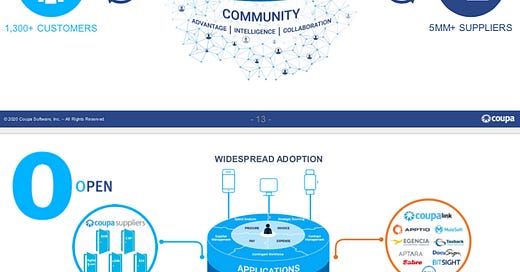In March of 2016, Analyst firm Gartner pronounced Business service management dead, stating that it “has not delivered on its promises of prioritizing, communicating and focusing I&O resources on the functions critical to the business.”
The unbundling of enterprise SaaS
The "old BSM" (as we will refer to it) was a promise to dynamically link underlying IT infrastructure and application components to enable business processes. As we would come to find out, this promise was unkeepable, and to be honest, we were probably a little naïve. After all, how could we expect now legacy software providers/solutions to keep up with the pace of technology, monitor, and manage all of the data and technology within an enterprise?
That rhetorical question seems condescending given that it was written in 2020 and is dunking on the enterprise software sales pitches of the early 2000s. BUT it is really the crux of disruption.
The opportunity for disruption "exists because when big companies become successful is when collective leadership becomes most focused on maintaining success. Leadership tends to see more risk in the downside of the current plan and then upside in taking on new things." -@stevesi. Steven goes on to hypothesize today's startups are facing massive technology companies in varying degrees of product-market fit. Thus, it seems unlikely companies like MSFT, GOOG, ORCL, ADBE, etc. will become less profitable, but consequently, it is unlikely the next "big thing" will come from them (addicted to cash flows). Furthermore, the difficulty in maintaining legacy tech means that companies have accumulated vast amounts of technical debt (aging codebases, clunky architecture, etc.) ultimately stifling innovation.
Introducing the star of the show - the “new BSM” (business spend management)
The "new BSM" refers to a set of business processes that are supported by software. Procurement, invoice management, and expense management – or all the ways your staff spends money. COUP a fast-growing enterprise SaaS company founded in 2006 is now the market leader in the BSM space and is executing it's growth strategy very well, stealing massive enterprise customers away from incumbents like ORCL and SAP (see our COUP Investment Memo).

BSM is merely one part of enterprise SaaS unbundling. The enterprise SaaS market is massive and even though there are huge companies competing in the space, no one company holds anything close to the dominant share of spend.
Given that every company is now a technology company, there is constant pressure to continually innovate and gather the best decision-making information and drive efficiencies across the entire enterprise including productivity, sales, marketing, accounting, HR, finance, etc. Today some startups are now spending over $700 a month per person on software - the opportunity for enterprise SaaS unbuilding is massive.
Learn Something
Coupa: Welcome to the Era of BSM – Business Spend Management
Tech Crunch: The Unbundling of Everything
Learning by Shipping: Steven Sinofsky – Competing with BigCo: 2018 Edition
Statechery: The Great Unbundling



